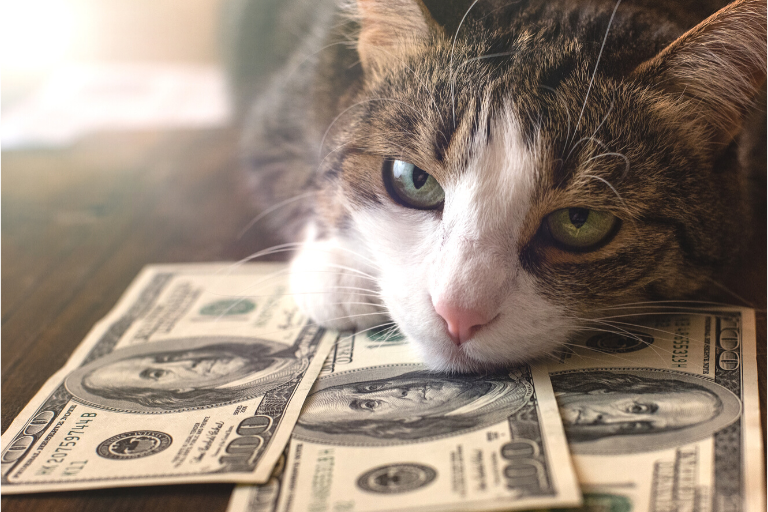When veterinary clients are declined for CareCredit, Scratchpay, Wells Fargo or similar third-party financing or loan products, it’s often assumed they must be a “bad credit risk” because they’ve probably been financially irresponsible and lax in paying their bills.
But did you know that someone can have an excellent credit score and a good payment history, and still be declined for a new line of credit? It isn’t all that uncommon, because lenders take into account more than just a credit score when they consider whether or not to approve someone for a loan or credit card.
The common assumption that clients who are declined for credit must be “financially irresponsible” is an overgeneralization and in many cases wrong. These individuals can actually have an excellent credit score and might have never missed a single payment.
They also might be one of the 26 million Americans who are “credit invisible,” meaning they have no credit history on file with one of the nationwide credit reporting agencies. Or they could be one of the 19 million who are considered “unscoreable,” which means they haven’t used credit in a while – their history has “gone stale” – or it is insufficient to produce a score using the most common scoring models.
Lenders look at many variables when deciding whether to extend credit. So let’s look at how someone could have a great credit score and still be declined for credit.
What Lenders Look For
How many open credit accounts do you have? You can have too many, or not enough. Either one of these will hurt you if you’re trying to get approved for a new line of credit. It’s best to be somewhere in the middle, but each lender has their own criteria for determining the “right” number.
Have you missed or been late with a payment recently? A single missed payment or an old unpaid medical debt won’t impact your credit score all that much – maybe it will drop by 10 or 20 points for a couple of years – but it won’t cause it to drop from 750 to 500. Still, it can be enough to prevent you from getting new credit. It takes about 7 years for missed payments to fall off your credit report, and a single mistake can prevent you from being approved for even a small line of new credit.
What is your credit limit on each of your credit accounts, and how much of it have you used? This is called “credit utilization.” If you have used more than about 30% of your available credit, your chances of being approved for any additional credit are diminished.
Have you recently applied for credit elsewhere? If you’ve applied for several credit cards within a relatively short time frame, that can make lenders nervous even if you have a great credit score. This could signal to them that you’re potentially taking on too much debt or heading into financial trouble, even if that’s not the case.
How often do you use your credit? This one is another conundrum. If you use it too often, that can ding you. If you don’t use it enough, that can ding you too.
How long have you been using credit? The longer you’ve been making timely monthly payments, the better your chance of getting approved for more credit. It can take years to build up a good credit history. Your credit age isn’t just determined by when you opened your first credit account, but the average age of all your credit accounts. Whenever you get a new loan or credit card, it reduces the average age of all your accounts.
You only need a credit history of 6 months to generate a credit (FICO) score, but that may still not be long enough to qualify for a new credit card or loan. This works against young people because they haven’t had time to build up a sufficient credit history, making them “credit invisible” and therefore ineligible for credit-based financing.
What is your current income? While your income has nothing to do with your credit score, it does play a role in whether or not you’re approved for new credit. If the amount of credit you’re requesting is too high relative to your income, you’re likely to get a denial.
Did you also know that what you have in your savings and checking accounts does not count toward your credit score? These accounts aren’t listed on your credit report and they aren’t tracked, because no borrowing or debt is involved.
In summary, just because a client is declined for CareCredit or similar financing products doesn’t mean you know everything about their financial picture, and it definitely doesn’t mean you should conclude that they are a bad risk for an in-house payment plan, because they may be more than capable of making payments over time. They may have plenty of savings, and they may have adequate discretionary income. A credit denial won’t tell you about any of that.
Relationships Matter
Let your relationship with the client help guide you in determining whether to extend an in-house payment plan.
The veterinarian-client-patient relationship is a crucial variable that gets left out of computer algorithms that determine approvals and declines for credit: there is nothing personal or relational about it. It’s purely transactional.
Most clients want to believe that their relationship with you and your practice plays an important role in the decision to offer financial relief when cost is a barrier to care. When clients perceive that these decisions are transactional rather than relational, they may feel disillusioned and abandoned when they are at a vulnerable and helpless moment with their pet.
Of course, it is easier to let someone or something else – like an impersonal, detached computer algorithm – make decisions for us when we are busy, stressed and have limited bandwidth to begin with (thanks to COVID, curbside, and overwhelming work hours.) But perhaps that bit of additional effort is worth it, because it can pay off in terms of strengthening the client’s bond with your practice.
Taking the time to nurture the veterinary-client-patient relationship by approaching client financial limitations with an open, collaborative, problem-solving orientation yields benefits for everyone: the client, the veterinary team, and especially the pet who needs treatment.
Don’t assume that a credit or loan denial means that offering an in-house payment plan is too big a risk. VetBilling sees repayment rates exceeding 95%, even when these clients have been turned down for third-party financing. That is a powerful testimony to the fact that a single credit denial does not tell the whole story about a client’s financial situation.
When Good Credit Isn’t Enough: Why You Could Be Denied a Credit Card Despite Your Excellent Score. Weliver, David: MoneyUnder30.com, March 31 2021. Accessed April 1, 2021.
My Credit Score is 750! Why Was I Denied a Card? Porche, Brady. Creditcards.com. October 9, 2017. Accessed April 1, 2021.
How You Can Be Denied for a Credit Card Even with Excellent Credit. Irby, Latoya. The Balance. March 1, 2020. Accessed April 1 2021.
Who Are the Credit Invisible? How to Help People with Limited Credit Histories. Scarborough, Michele. Consumer Financial Protection Bureau, May 2016. Accessed April 1, 2021.
30 Credit Score Statistics for 2021. Lexington Law, February 5, 2021. Accessed July 6, 2021.

